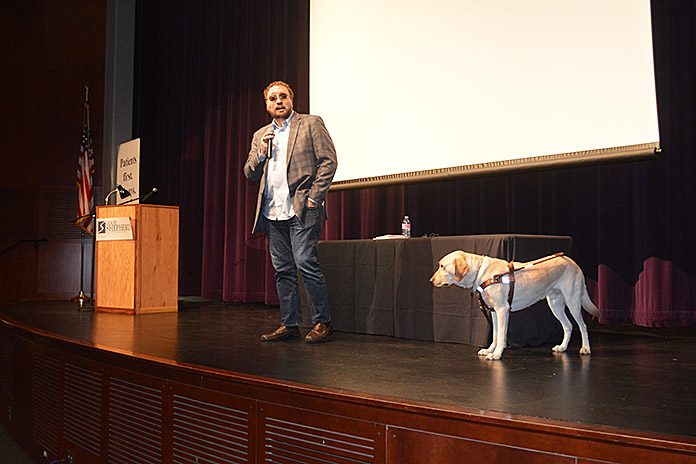
When terrible things happen to innocent people, the question one asks is, “Why?”
Something terrible happened to Marcus Engel when he was a freshman in college. A drunk driver smashed into the car he was riding in, crushing his face and blinding him for life.
Like most people who suffer terrible personal tragedy, he asked himself, “Why?”
The answer was evident throughout Engel’s talk Wednesday night during Good Shepherd Health Care System’s second annual community meeting. Engel entertained and inspired the crowd at the Hermiston High School auditorium with his story of tragedy, recovery and the message he brought home again and again: Change what you can in your life and don’t worry about the rest.
Engel was six weeks into his college life when he came home for a weekend and went out with some friends. As they approached an intersection with a red light, his friend began slowing the car down. Before he came to a full stop, the light turned green and his friend proceeded to pick up speed as he continued through the intersection. Engel recalls turning to his right to look into the passenger side rear-view mirror and all he could see were two headlights inches from his face.
A drunk driver had ran a red light and in an instant, Engel’s life was changed forever.
What has never left him in the ensuing 20-plus years were the two words he could hear whenever he drifted back into consciousness in the immediate aftermath of the accident.
“I’m here, Marcus. I’m here.”
It was a 20-year-old nursing tech, what Engel refers to as the lowest rung of the ladder of power in a hospital setting.
“It was then that I knew I wasn’t alone,” Engel said. She held his hand throughout the nightmarish hours after the wreck.
That, said Engel, made all the difference.
“Human presence is the cornerstone of care,” he said. “That’s what separates us from the rest of the animal kingdom – the ability to be present in the moment for someone.”
While in recuperation – a process that took two years and more than 350 hours of reconstructive facial surgery – Engel wondered what there was left for him in life. He was depressed and couldn’t understand why this happened to him.
Then he recalled some advice he received a few years earlier from his high school principal – change what you can in your life and don’t worry about the rest.
Engel couldn’t change the fact that he was blind, though it took him a while to accept that. But he could change his attitude. He moved to Denver and enrolled in the Colorado Center for the Blind and learned to read Braille, cook and how to orient himself in total darkness. He later returned to college, but found himself aimless.
His life took a major turn when a friend asked him to work as a counselor at a summer camp for kids. A mother of one of the campers later wrote that her son had a terrible time due to being teased because he was overweight. The only good part of the camp, she wrote, was a counselor named Marcus who treated her son like everyone else.
“My head perked up when I heard that,” he said. Whether it fully set in at that moment is unclear, but Engel soon realized he had a gift that could help other people get through personal trauma.
Today, Engel is the author of five best-selling books and holds a bachelor’s degree in sociology from Missouri State University and a master of science in narrative medicine from Columbia University in New York City. He has been awarded an honorary doctorate from the Philadelphia College of Osteopathic Medicine and is an adjunct professor at the University of Notre Dame where he teaches pre-med students the art of “Being With.”
But one thing had stuck in his head all those years following the accident: Who was the nurse who held his hand and reassured him that she was “here?”
The answer came 20 years later when he was invited to speak at the hospital where he was treated. It was arranged that a reunion would take place at the hospital. It was an emotional moment. Engel asked Jennifer if she remembered the night of the accident.
“She said she remembered everything,” Engel recalled. And it was because she was fully present in the moment with Engel – the cornerstone of care. Watch a video of the reunion here.
And to put a bow on the story, when Engel’s prior guide dog, Garrett, was ready to retire, it was Jennifer who adopted him.
At the end of his talk, he reiterated the question he asked himself after the accident – why?
Then he asked the audience if they got anything at all from what he had to say and the audience loudly applauded.
“That’s is the answer to ‘why? ’’








